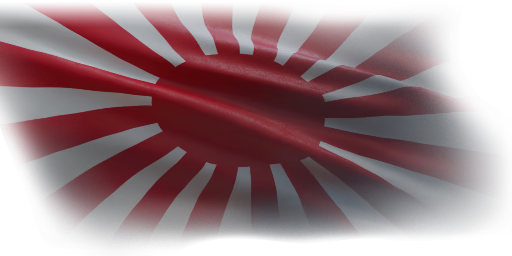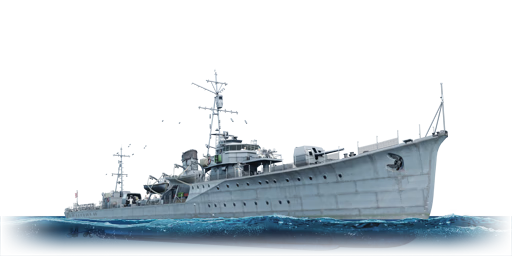



The Chidori (千鳥, namesake: Plover) was a 600-ton Chidori-class vessel that was designed to avoid the restrictions of the London Navy Treaty on destroyer tonnage. It was classified as a torpedo boat instead of a destroyer, even though it had half the firepower of the Fubuki-class destroyer. However, the Chidori class had problems with stability and weight due to its excessive armament. The 3rd ship of the class, Tomozuru, capsized during a naval exercise and raised doubts about the quality of Japanese ships. The Chidori class was modified by reducing and changing its weapons (from 12.7 cm to 12 cm guns and removing one torpedo mount) and adding bulges. The remaining 16 ships out of 20 planned were canceled and the funds were redirected to a new Ōtori-class torpedo boat, which had better balance.
The Chidori was introduced in Update "Raining Fire". Designed as a lighter vessel carrying destroyer armament to evade the Naval Treaty, in War Thunder as her final 1944 refit she hasn't escaped, and instead faces the destroyers she was designed to mimic with weaker firepower. Only offering a single dual 533 mm torpedo mount and three 12 cm cannons, she plays like a weaker and more vulnerable Mutsuki-class, but at the end of the tree resulting in a lengthier grind for the same destroyer introductory gameplay. One of the redeeming factors Chidori has as a 1944 refit is her array of 25 mm anti-air which is far superior to her opponents and will leave pilots surprised to face heavy AA resistance at this tier.
| Ammunition | Type | Armor penetration (mm) at a distance: | |||||
|---|---|---|---|---|---|---|---|
| 1000 m | 2500 m | 5000 m | 7500 m | 10000 m | 15000 m | ||
| HE | 24 | 24 | 24 | 24 | 24 | 24 | |
| HE-TF | 24 | 24 | 24 | 24 | 24 | 24 | |
| SAP | 114 | 87 | 56 | 37 | 26 | 24 | |
| Belt | Belt filling | Armor penetration (mm) at a distance: | |||||
|---|---|---|---|---|---|---|---|
| 10 m | 100 m | 500 m | 1000 m | 1500 m | 2000 m | ||
| HEF-T/HEF/AP-T/HEI | 55 | 53 | 44 | 37 | 32 | 29 | |
| AP-T/AP-T/AP-T/HEF | 55 | 53 | 44 | 37 | 32 | 29 | |
| HEF-T/HEI/HEI/HEI | 5 | 5 | 4 | 4 | 4 | 4 | |
| Belt | Belt filling | Armor penetration (mm) at a distance: | |||||
|---|---|---|---|---|---|---|---|
| 10 m | 100 m | 500 m | 1000 m | 1500 m | 2000 m | ||
| HEF-T/HEF/AP-T/HEI | 55 | 53 | 44 | 37 | 32 | 29 | |
| AP-T/AP-T/AP-T/HEF | 55 | 53 | 44 | 37 | 32 | 29 | |
| HEF-T/HEI/HEI/HEI | 5 | 5 | 4 | 4 | 4 | 4 | |
12 × Type 95 depth charge
12 × Type 95 depth charge
32 × Type 95 depth charge
32 × Type 95 depth charge
12 × Type 95 depth charge











Seakeeping |
|---|
Unsinkability | |
|---|---|
Firepower | ||
|---|---|---|